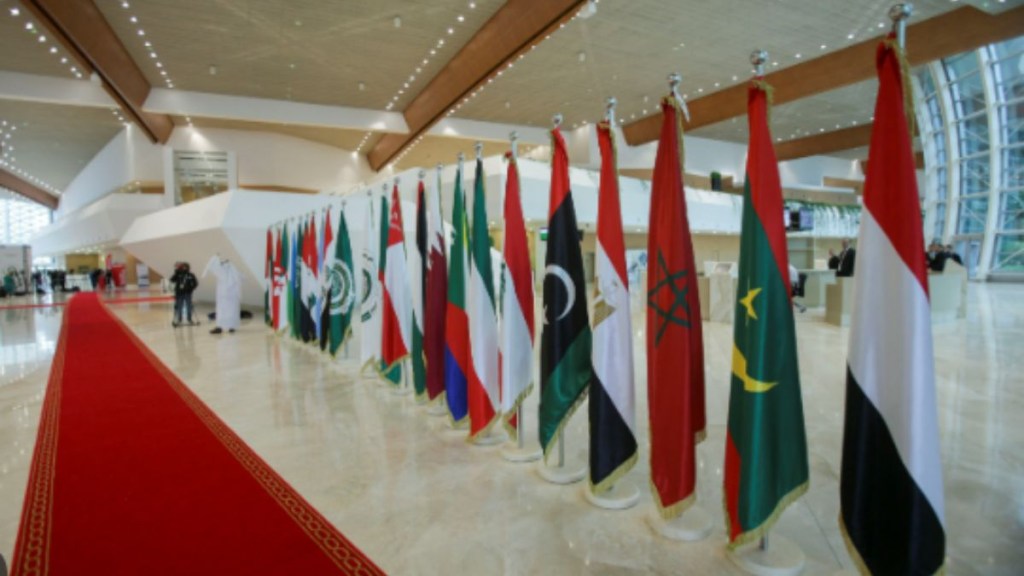Amidst the ongoing Israel-Hamas War, an emergency session of the Summit of Arab heads of state and leaders is scheduled to take place under the presidency of Saudi Arabia in Riyadh later this month.
The meeting is set for November 11, 2023, a Saturday, and Saudi Arabia is chairing the current 32nd session of the Arab League. The Arab League Emergency Summit, scheduled for November 11 in Riyadh, is a pivotal gathering in response to the ongoing Israel-Hamas conflict and the dire humanitarian situation in the Gaza Strip. This summit, convened at the behest of the Palestinian Authority and Saudi Arabia, is a testament to the urgency of addressing these pressing issues.
Heightened Security
As the date of the summit draws near, Riyadh is expected to experience an intensification of security measures. Security authorities will likely bolster their presence in and around the venue where the summit will take place. This surge in security is not confined solely to the immediate vicinity of the summit; it’s anticipated that checkpoints and road closures may be implemented along major routes connecting the venue to King Khalid International Airport (RUH). In anticipation of the arrival and departure of key figures, temporary airspace closures around Riyadh may also be enforced, potentially causing flight delays in the days surrounding the event.
Situation on the ground
Israeli troops have advanced more than two miles into Gaza, marking an expansion of their ground operation. This escalation is taking place against a backdrop of growing concerns about the erosion of civil order in Gaza and the immense challenges associated with evacuating patients from hospitals located in the northern part of the region.
UNRWA, the UN agency responsible for Palestinian refugees in Gaza, has reported that hundreds of patients are currently stranded in hospitals in northern Gaza, with limited mobility to travel southward. These reports echo the concerns expressed by medical professionals and charitable organizations, all citing the significant difficulties in moving patients from hospitals, such as the Al-Quds Hospital, in the face of ongoing hostilities.
Israel, meanwhile, has announced that it has transitioned to a “second stage” of its military operations against the militant group Hamas. The Israeli Prime Minister, Benjamin Netanyahu, has indicated the country’s preparedness for a “long and difficult” conflict as it endeavors to dismantle and “destroy” Hamas, following the attack on Israel by the group on October 7, which claimed over 1,400 lives.
The intensification of operations in Gaza has not only sparked concerns about a wider regional conflict but has also led to heightened calls for a humanitarian ceasefire from various leaders, including the United Nations. The organization has voiced apprehensions about the deteriorating civil order in Gaza and has emphasized the urgent need for a ceasefire and the delivery of sustained humanitarian relief.
Aid organizations, on their part, have raised serious objections to the evacuation orders issued in the midst of an active conflict, citing the formidable challenges faced by civilians in moving within Gaza while it remains under attack. The United Nations, acknowledging the insufficiency of aid reaching Gaza, has been making earnest appeals for increased humanitarian assistance.
US President Joe Biden has engaged with both Israeli Prime Minister Netanyahu and Egyptian President Abdel Fattah El-Sisi, emphasizing the imperative of maintaining the flow of aid into Gaza and safeguarding the lives of civilians caught in the crossfire.
Tragically, since October 7, the death toll in Gaza has continued to rise, with the Palestinian Ministry of Health in Ramallah reporting a grim figure of 7,960. Save the Children, a prominent relief group, has decried the devastating impact of the conflict on children, stating that over 3,000 children in Gaza have lost their lives in the past three weeks.
The widespread destruction and mounting casualties have ignited fury and protests across the Middle East and in other parts of the world. In a recent incident, an enraged crowd in Russia’s predominantly Muslim region of Dagestan stormed an airport that received a flight from Israel, compelling authorities to close the facility and redirect flights.
Israel’s actions in Gaza have not gone unnoticed on the global stage. Iranian President Ebrahim Raisi has declared that Israel has “crossed the red lines” in Gaza, raising the possibility of collective action by regional powers. US security adviser Jake Sullivan has also cautioned about the heightened risk of a broader conflict in the Middle East.
Egypt and Saudi Arabia, in response to Israel’s expanded military operations, have issued warnings about the potential destabilization of regional security. These developments underscore the far-reaching implications of the Israel-Hamas conflict, with the potential to disrupt regional stability.
Turkish President Erdogan has unequivocally voiced Turkey’s stance on the Palestinian situation, expressing a willingness to collaborate with regional countries to address the crisis. He criticized Israel’s actions and called for an immediate halt to the conflict. Erdogan emphasized the necessity of establishing a new security mechanism in the region, to which Turkey is prepared to contribute.
Furthermore, Erdogan announced Turkey’s intent to file a lawsuit against Israel at the International Criminal Court, signifying the gravity of the situation and Turkey’s commitment to pursuing justice for the victims.
The conflict has prompted global calls for a ceasefire, and regional powers are expressing their concerns about the potential for broader instability. The world is watching closely as leaders grapple with the complex dynamics of this deeply troubling crisis.
